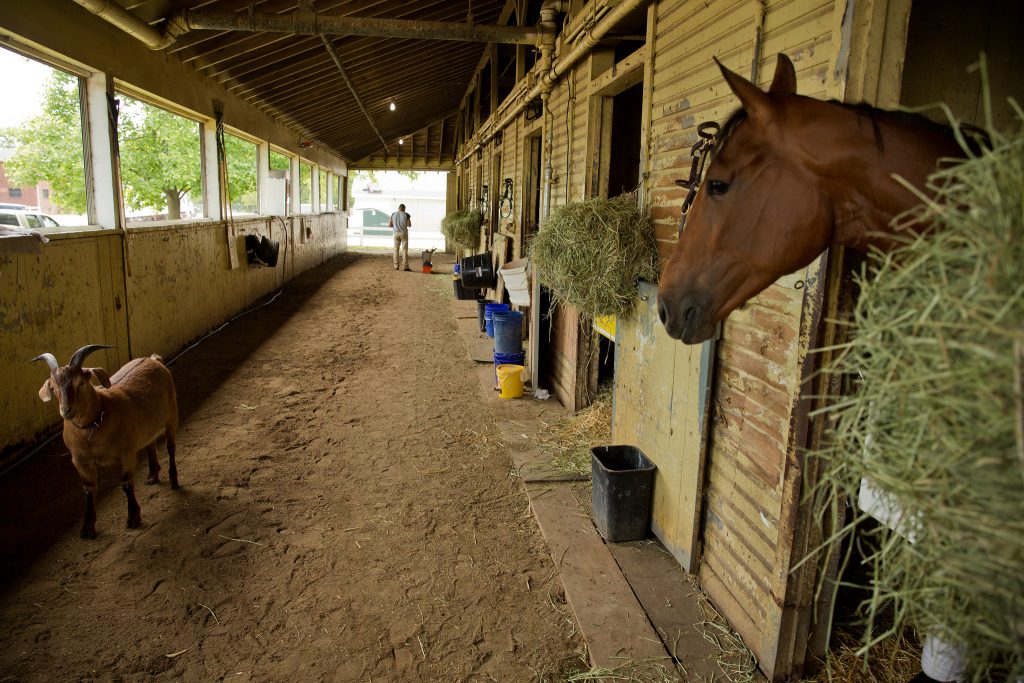Getting the Horse’s Goat
The Kentucky Derby — the world-famous horse race each spring — is often called “the fastest two minutes in sports.” Each spring, a field of typically 20 horses takes to the track at Churchill Downs racetrack in Louisville, with each thoroughbred and jockey pair aiming to finish the 10 furlongs (2 kilometers) race before the rest of the pack. Despite the days of fanfare before the main event, the race itself is very short; the winner crosses the line about two minutes after the starting gate opens.
But horses aren’t the only animals involved in the race. Another creature — the humans riding the horses notwithstanding — can be a critical member of a successful horse’s team. These guys:

Yeah, the guy on the left. That’s a goat.
Like humans, horses can get nervous. And if you’re looking to turn an expensive thoroughbred into a prizewinner, that’s bad; it’s difficult at best to train a skittish horse — and dangerous for jockey and trainer alike. There are probably pharmacological solutions to that problem, but those come with all sorts of side effects. And, it turns out, a little bit of companionship tends to do the trick.
Just like people tend to soften a bit when playing with dogs, horses calm down nicely when paired with others. Miniature donkeys, ponies, and even pigs are common, but it is goats that really help horses the most. And it’s been like that for ages. Bette Gabriel, a trainer at a central Illinois racecourse, told the Chicago Tribune that “the practice of keeping a goat in the stall with a nervous horse has been around for a long time, probably as long as there have been racehorses.” And per Gabriel, there were some cases ” where a horse would become so attached that its goat would have to be brought along to the paddock every time the horse raced.”
But unlike our relationships with our dogs and cats, this isn’t a situation where the goat is the horse’s pet. More accurately, the goats act as nannies for the nervous Nellies. “Most of the track goats and horses develop a lifelong friendship,” per the Tribune, with the goat acting as a caretaker of sorts, attending to their horse-partner whenever the latter seems out of sorts. There are even some goats that don’t wed themselves to a single horse, but rather roam around looking for one in need. At Churchill Downs, according to the Courier-Journal, there’s a goat named Roxanne that does exactly that: “Roxanne is good at sniffing out horses that are set to race that day, almost rotating her calming services around the barn.”
But while the longstanding history of horse-goat pairs is well-known in racing circles, the reason for the match is something we can only guess at. According to the New York Times (where the above photo comes from), “it is unclear why so many horses have particular goat friends,” which no meaningful efforts underway to better understand their unique relationship.
Bonus fact: Goats also like people (although not to the same degree), and particularly, they like happy people. According to a 2018 study, goats can likely differentiate between happy human faces and not-so happy human faces, and are more likely to approach those with the former. Phys.org explains: “images of happy faces elicited greater interaction in the goats who looked at the images, approached them and explored them with their snouts. This was particularly the case when the happy faces were positioned on the right of the test arena suggesting that goats use the left hemisphere of their brains to process positive emotion.”
From the Archives: Google’s Lawn Mowing Goats: Who needs lawnmowers when you have horse-friends?
